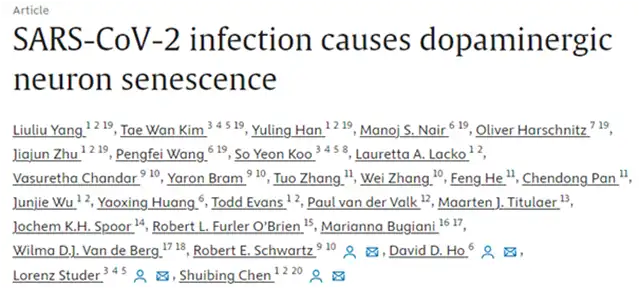Coronavirus Can Infect Dopaminergic Neurons and Induce Senescence
- Normal Liver Cells Found to Promote Cancer Metastasis to the Liver
- Nearly 80% Complete Remission: Breakthrough in ADC Anti-Tumor Treatment
- Vaccination Against Common Diseases May Prevent Dementia!
- New Alzheimer’s Disease (AD) Diagnosis and Staging Criteria
- Breakthrough in Alzheimer’s Disease: New Nasal Spray Halts Cognitive Decline by Targeting Toxic Protein
- Can the Tap Water at the Paris Olympics be Drunk Directly?
Coronavirus Can Infect Dopaminergic Neurons and Induce Senescence
- Should China be held legally responsible for the US’s $18 trillion COVID losses?
- CT Radiation Exposure Linked to Blood Cancer in Children and Adolescents
- FDA has mandated a top-level black box warning for all marketed CAR-T therapies
- Can people with high blood pressure eat peanuts?
- What is the difference between dopamine and dobutamine?
- How long can the patient live after heart stent surgery?
Coronavirus Can Infect Dopaminergic Neurons and Induce Senescence
In a recent study, a collaborative effort between Dr. Shuibing Chen’s team from Weill Cornell Medicine, Lorenz Studer from Memorial Sloan Kettering Cancer Center, Da-Yu He from Columbia University, and Robert E. Schwartz from Weill Cornell Medicine has revealed that the coronavirus SARS-CoV-2, responsible for COVID-19, can infect dopaminergic neurons in the brain, leading to their senescence – a state where these neurons lose their ability to grow and divide.
The findings, published online on January 17, 2024, in the journal Cell Stem Cell, suggest that further research may unveil neurosymptoms associated with long COVID, such as brain fog, lethargy, and depression.

The study indicates that dopaminergic neurons infected with SARS-CoV-2 cease to function and emit chemical signals that trigger inflammation. Under normal circumstances, these neurons produce dopamine, a neurotransmitter crucial for pleasure, motivation, memory, sleep, and movement. Damage to these neurons is also linked to Parkinson’s disease.
Dr. Shuibing Chen, the senior author and director of the Genomic Health Center at Weill Cornell Medicine, stated, “This project was initially aimed at understanding how various cell types in different organs respond to SARS-CoV-2 infection. We tested lung cells, heart cells, pancreatic beta cells, but the senescence pathway was only activated in dopaminergic neurons. This was a completely unexpected result.”
The research, led by Dr. Chen, previously focused on generating various cell types from human stem cells and testing them to identify which cells are susceptible to SARS-CoV-2 infection. This approach allowed them to investigate the range of tissues the virus might infect during COVID-19, given the diverse symptoms observed in different patients. The team also examined autopsy samples from SARS-CoV-2-infected patients to confirm their findings from laboratory-cultured cells.
Surprisingly, they found that the proportion of dopaminergic neurons infected when exposed to SARS-CoV-2 was small, approximately 5%. Dr. Chen noted, “The infection rate of dopaminergic neurons is not as high as lung cells, which are the primary targets of this virus. However, even a small fraction of infected dopaminergic neurons could have serious consequences.”
Interestingly, not all types of neuronal cells are equally susceptible to virus infection. The authors observed that cortical neurons, under the same experimental conditions, did not allow SARS-CoV-2 infection.
To protect dopaminergic neurons, the authors used transcriptome analysis to understand how SARS-CoV-2 infection alters gene activity and changes cell behavior. Dr. Chen explained, “We found that only the senescence pathway of dopaminergic neurons was activated. In stark contrast, the aging pathway genes in lung-like organs, pancreatic cells, liver-like organs, or heart cells infected with SARS-CoV-2 did not show significant activation.”
The authors discovered that the gene characteristics of infected dopaminergic neurons, whether cultivated in the lab or obtained from autopsy samples of COVID-19 patients, exhibited a unique pattern of gene activity, including genes that trigger inflammatory chemical signals.
Moving forward, the researchers are exploring ways to protect these neurons, aiming to reduce the risk of neurological defects in patients after virus infection. They tested various drugs already on the market for treating various diseases to find one that could either prevent SARS-CoV-2 infection or prevent senescence in infected dopaminergic neurons. Their screening results identified three drugs – Riluzole (for treating amyotrophic lateral sclerosis), Metformin (for treating diabetes), and Imatinib (for treating cancer) – that could prevent SARS-CoV-2 infection and subsequently prevent dopaminergic cell senescence. Further research on these drugs may provide insights into preventing the virus from attacking the brain.
While the clinical significance of these findings is not yet clear, the authors suggest monitoring the risk of long COVID patients developing symptoms associated with Parkinson’s disease. Until now, there have been limited reports of Parkinson’s disease symptoms in population studies related to COVID-19.
Coronavirus Can Infect Dopaminergic Neurons and Induce Senescence
References:
Liuliu Yang et al. SARS-CoV-2 infection causes dopaminergic neuron senescence. Cell Stem Cell, 2024, doi:10.1016/j.stem.2023.12.012.
SARS-CoV-2 can infect dopamine neurons causing senescence
https://medicalxpress.com/news/2024-01-sars-cov-infect-dopamine-neurons.html
(source:internet, reference only)
Disclaimer of medicaltrend.org
Important Note: The information provided is for informational purposes only and should not be considered as medical advice.



